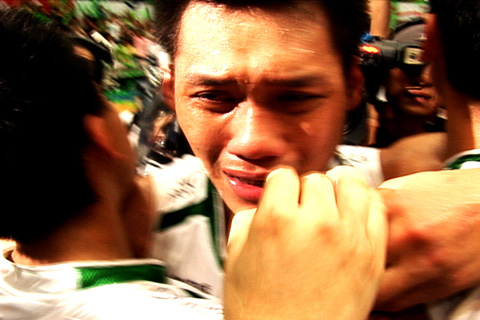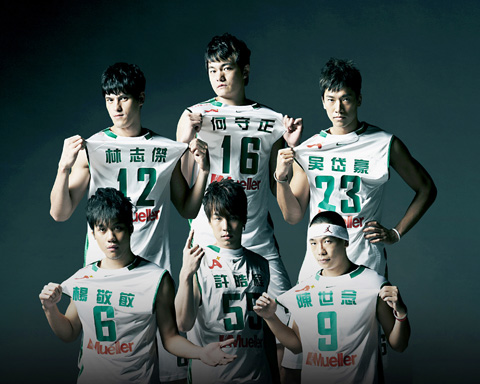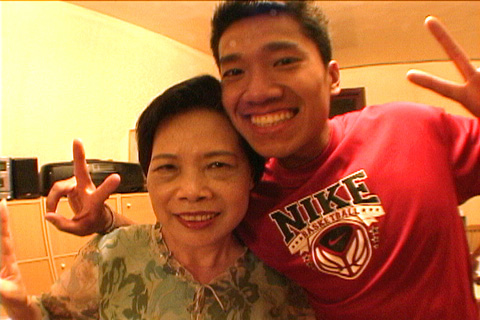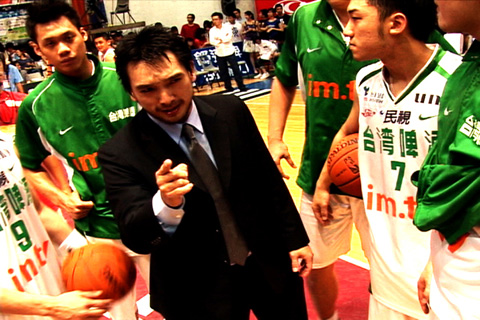During the Straits Cup basketball tournament in Miaoli last September, reigning local champions Taiwan Beer (台灣啤酒籃球隊) were in the process of losing to China's Jiangsu Nangang Dragons when one of the Chinese players elbowed his Taiwan Beer opponent in the face. Two days later, Taiwan Beer's management ignored an apology from the Dragons and removed its team from the competition. Its players, the team said, were afraid of their Chinese opponents.
It seems a little rich then, to say the least, that a new documentary made about the Taiwan Beer basketball team is called Attitude. This, after all, is the team that wimped out of a tournament while the documentary was in production. So what does "attitude" mean? Sportsmanship and professionalism? Or self-absorbed preening?

PHOTO COURTESY OF ZEUS INTERNATIONAL PRODUCTION
Ostensibly, Attitude - which was produced and financed by basketball player-turned-entertainer Chen Jien-chow (陳建州), better known as "Blackie" (黑人), who is also the team's PR director - is about dreams, friendship and refusing to give up, and its tone is exhaustingly positive. It begins with Blackie reminiscing about Taiwan Beer's recent past and how it rose from being a team that nearly fell apart in 2003 to a second place finish two seasons later. Thanks to unimaginative camera work and editing, the first 20 minutes feel more like a boring speech than a movie.
Things take a lachrymose turn when a junior high school teacher and Taiwan Beer fan surnamed Lin appears. Lin is terminally ill with cancer but is still optimistic and upbeat about life, and his last words, spoken in front of the camera, provide the film's only genuine emotional moment. After Lin dies and Blackie attends his funeral, the tearjerker subplot continues with an episode about basketball star Sam Ho's (何守正) close relationship with his late father and his mother, who he visits in the hospital after practice.
Subsequent chapters ensure that there is no shortage of humor and drama, as basketball fans are wooed with behind-the-scenes glimpses of the celebrity athletes. Viewers see Lin Chih-jeh (林志傑), the SBL's most valuable player, threaten the director and order him to turn off the camera. There's also plenty of brotherly love: players kissing each other on a bus, and horseplay that involves pulling each other's clothes off after practice. Not surprisingly, things come to an end with the team's victory in the 2007 SBL finals, which conveniently (for the film's sake) occurred before its craven exit from the Straits Cup later in the year.

PHOTO COURTESY OF ZEUS INTERNATIONAL PRODUCTION
There is nothing wrong with making a film that seeks to inspire people and encourages them to see the bright and sunny side of things. But it's troubling when a film seems like an extended publicity vehicle that aims to advertise SBL stars much in the same way as the movie Stars (星光傳奇) sought to enhance the celebrity of pop idol contestants in the "talent" show One Million Star (超級星光大道). To be fair, Attitude can at times be reasonably entertaining. But the real never-give-up spirit on display here has nothing to do with sports: it's the moxie that Blackie has displayed by risking more than NT$5 million of his own money on a film that, if it succeeds at the box office, will make himself and his teammates more famous.

PHOTO COURTESY OF ZEUS INTERNATIONAL PRODUCTION

PHOTO COURTESY OF ZEUS INTERNATIONAL PRODUCTION

PHOTO COURTESY OF ZEUS INTERNATIONAL PRODUCTION

On April 26, The Lancet published a letter from two doctors at Taichung-based China Medical University Hospital (CMUH) warning that “Taiwan’s Health Care System is on the Brink of Collapse.” The authors said that “Years of policy inaction and mismanagement of resources have led to the National Health Insurance system operating under unsustainable conditions.” The pushback was immediate. Errors in the paper were quickly identified and publicized, to discredit the authors (the hospital apologized). CNA reported that CMUH said the letter described Taiwan in 2021 as having 62 nurses per 10,000 people, when the correct number was 78 nurses per 10,000

As we live longer, our risk of cognitive impairment is increasing. How can we delay the onset of symptoms? Do we have to give up every indulgence or can small changes make a difference? We asked neurologists for tips on how to keep our brains healthy for life. TAKE CARE OF YOUR HEALTH “All of the sensible things that apply to bodily health apply to brain health,” says Suzanne O’Sullivan, a consultant in neurology at the National Hospital for Neurology and Neurosurgery in London, and the author of The Age of Diagnosis. “When you’re 20, you can get away with absolute

May 5 to May 11 What started out as friction between Taiwanese students at Taichung First High School and a Japanese head cook escalated dramatically over the first two weeks of May 1927. It began on April 30 when the cook’s wife knew that lotus starch used in that night’s dinner had rat feces in it, but failed to inform staff until the meal was already prepared. The students believed that her silence was intentional, and filed a complaint. The school’s Japanese administrators sided with the cook’s family, dismissing the students as troublemakers and clamping down on their freedoms — with

As Donald Trump’s executive order in March led to the shuttering of Voice of America (VOA) — the global broadcaster whose roots date back to the fight against Nazi propaganda — he quickly attracted support from figures not used to aligning themselves with any US administration. Trump had ordered the US Agency for Global Media, the federal agency that funds VOA and other groups promoting independent journalism overseas, to be “eliminated to the maximum extent consistent with applicable law.” The decision suddenly halted programming in 49 languages to more than 425 million people. In Moscow, Margarita Simonyan, the hardline editor-in-chief of the